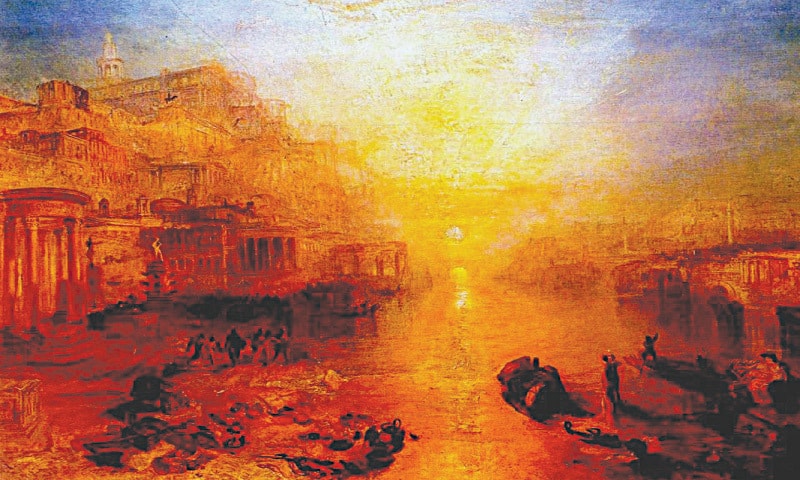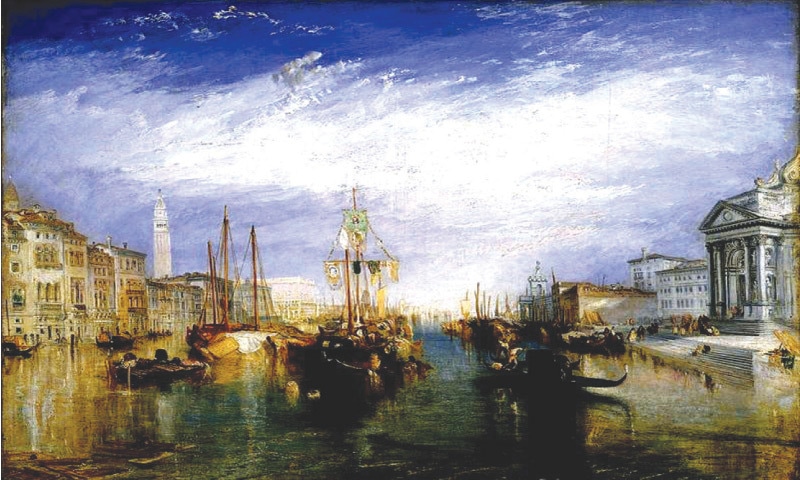Organisers at London’s Tate Gallery and at Jacquemart André Museum had been working for months on an ambitious venture, to bring the paintings of Joseph Mallord William Turner to Paris as of March last for an unusual show. But the whole project remained in an uncertain deadlock due to Covid-19 restrictions.
Recently the museum, only a few minutes’ walk from the Arc of Triumph, has finally succeeded in opening the exhibition to the public until January next year. What a thrill to see these works for the first time in Paris!
Turner, born in London in 1775, is considered to be the greatest watercolour painter, who had mastered and invented, while still in his mid-20s, a number of techniques to highlight the magical effects of the rays of sun and moon on landscapes, hills, lakes and rivers, not only of his own country but of Italy, Switzerland and France, where he travelled frequently all his life. Now more than 60 of Turner’s aquarelles as well as a dozen oil paintings can be seen outside the Tate gallery for the first time in history.
John Ruskin, a leading art critic of the Victorian era and a contemporary of Turner, had in the beginning criticised him as an “overambitious young fellow” but finally recognised his talents, calling him “the greatest genius of our times, who works only for his own pleasure.”
As a student at the Royal Academy of Fine Arts, Turner realised that travelling had to be an essential part of his exploits. He quickly developed a routine of visiting all the spectacular points of the British, Irish and Scottish countryside, sea ports and mountains, sketchbook in hand. Later, when he had the means as a mature and recognised artist, he started his indefatigable travels across the Channel.
Jacquemart André Museum finally succeeds in bringing the legendary artist Joseph Turner’ s works to Paris
Turner’s oil paintings are also excellent but he had a penchant for aquarelles, convinced that watercolour offered him wider liberties to epitomise the sensations caused by the reflections of a setting sun or rising moon on lakes and hills. His achievements were so stunning that, only at the age of 32, he was appointed professor at the Royal Academy. But this was hardly the peak of the young artist’s achievements. As a landscape theorist, he soon began publishing his Liber Studiorum (‘Book of Studies’ in Latin), a collection of prints of his idealistic images representing “architectural, historical, marine, mountainous, pastoral and elevated-pastoral scenes”, to use Turner’s own terminology.

Turner remained particularly enchanted by Rome and Venice, where he would stay for months every year, visiting historical sites and interpreting classical legends on canvases. ‘Grand Canal Of Venice’ and ‘Ovid Banished From Rome’ are only two examples, among so many, of his fascination with Roman mythology.
Despite hectic European travels, Turner remained devoted to his own country. His engravings ‘Rivers of England’ and ‘Ports of England’, not to forget ‘Picturesque Views In England & Wales’, became indispensible parts of his book.
Turner made his final trip to Venice in 1840 and worked on an ultimate series of aquarelles that are considered by experts to be his finest creations. This time, his obsession was to capture the interplay of light and reflections across the lagoon through translucent colour combinations. To capture these details every minute of day and night, he worked without bothering to sleep.
John Ruskin once again paid compliments to Turner, calling him “a magician with a command over the spirits of earth, air, fire and water.”
After more than half a century of work and ceaseless travels, Turner made his final crossing of the Channel in 1845, reaching the coast of Normandy in France, “looking out for storms and shipwrecks” as he described it.
He died six years later, leaving behind him an incredible legacy.
“Collections de la Tate” is being exhibited at the Jacquemart André Museum in Paris from May 26, 2020 to January 11, 2021
The writer is an art critic based in Paris. ZafMasud@gmail.com
Published in Dawn, EOS, Octoberr 18th, 2020














































Dear visitor, the comments section is undergoing an overhaul and will return soon.